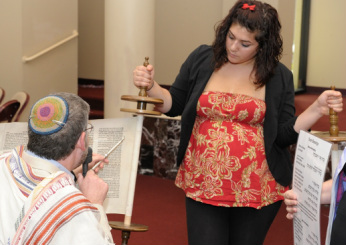| Simchat Torah was either last night or will be tonight, depending on what kind of synagogue you attend and where you are located. For Conservative and Orthodox Jews outside the Land of Israel, it's tonight. For Reform and Reconstructionist Jews and for everyone in the Land of Israel, it was last night. (Why the difference? Check out the post, One Seder or Two? In communities that celebrate two days of Shmini Atzeret, Simchat Torah is the second day.) |
Vezot Haberachah tells the story of the very last hours of Moses' life and it tells the story of his death. Moses offers a final blessing to each of the tribes of Israel, then he climbs to the top of Mount Nebo, where God shows him the full extent of the land that he has spent a lifetime trying to reach. In the end, though, God tells him that he will not be permitted to enter the land himself. Instead, he dies on the mountaintop and is buried there by God.
The text makes a point to say that "to this very day, no one knows where his grave is" (Deuteronomy 34:6). Moses leaves no shrine where his descendants can go to worship at the site of his bones. His legacy, instead, is only in this profound declaration: "Never again in Israel did there arise a prophet like Moses who knew Adonai face to face." The death of Moses marks the final curtain. The End.
Until the next beginning.
The reason why we read these words only on Simchat Torah is that they can never be the final words. As soon as we finish the story of Moses' death and burial, we immediately start anew by reading a single aliyah from the very beginning of the Torah. Tradition teaches that it should never be said, "the Jews have finished studying the Torah," and so we don't. We go straight from the end to the beginning.
This is a lesson beyond the simple idea of devotion to our studies. The Torah imitates the true shape of our lives. Nothing is ever finished. Every challenge we face in life is merely the prelude to the next. Every closing introduces us to new vistas to be discovered—just as Moses, in his final moments, looked out from Mount Nebo to see the place where the next chapter in the life of the Israelites would be played out.
Even death is not an ending. The Jewish ideal of a meaningful life is one that continues to matter. For such a life, death is no obstacle or barrier. The significance of our life continues into the next chapter of our families, our communities, the Jewish people and the world. There is no end.
This is who we are. We Jews are the people of "end, beginning, end, beginning." Throughout history, we have known many endings. The First Temple ended. The Second Temple ended. Prophecy ended with Malachi and the Mishnah was completed by Rabbi Judah HaNasi. The Golden Age of Spain ended with the expulsion of 1492, and the great Jewish communities of Lithuania, Poland, Hungary and Germany ended with the Holocaust.
Except that they didn't. Just like the life of one individual persists, so does our people. We keep reinventing ourselves, rediscovering ourselves, redefining ourselves to be reborn in a new age. Just as they say about Torah, so it is true of the Jewish people—"Turn it over, turn it over, because everything is inside of it" (Pirkei Avot 5:26).
Other Posts on This Topic:
Sh'mini Atzeret: Prayer for Rain
The Light that Defies Death


 RSS Feed
RSS Feed
